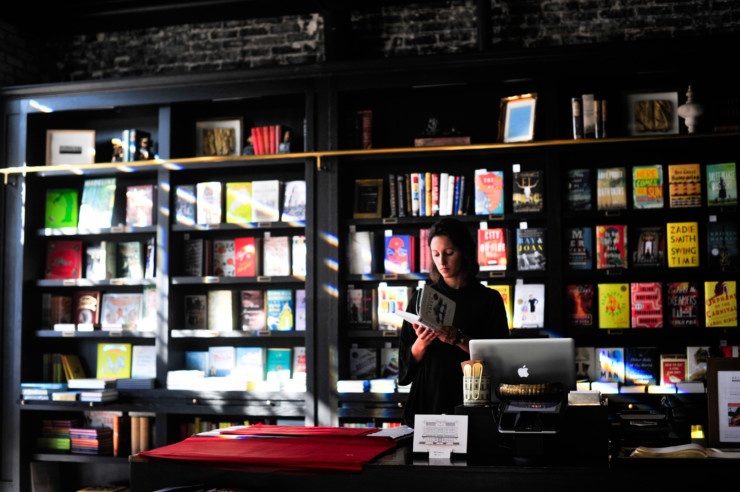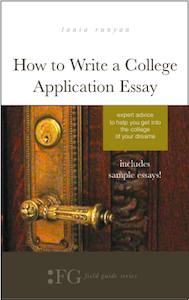On Tuesday, Trident Media Group literary agent Mark Gottlieb discussed what a work day is like for him, a recent project (Tropic of Kansas by Christopher Brown) he’s worked on, and how he became a literary agent. Today, he concludes our interview with a discussion about “platform,” self-publishing and its role in the industry, and the state of the contemporary publishing industry. You can read Part 1 here.
I’ve heard that some publishers won’t even look at an author who has fewer than 10,000 followers on Twitter. Overstated? What are publishers looking for in terms of an author’s “platform?”
I’m finding that the importance of platform in author’s career has also made its way into the world of fiction, to an extent. In looking for an ideal fiction client with a platform, I look for authors that have good writing credentials such as experience with writing workshops, conferences, or smaller publications in respected literary magazines. Having awards, bestseller status, a strong online presence, or pre-publication blurbs in-hand for one’s manuscript is also very promising in the eyes of a literary agent.
Platform is even more important in considering nonfiction authors. It’s not enough for an author of nonfiction to be a respected authority on their subject matter—it’s important to publishers to know that such authors have a big online presence or social media following. That’s why selling celebrity fiction to publishers is almost a no-brainer. Publishers get this strange thought in their minds that if any given celebrity has 100,000 followers or more, if even just ten percent of those followers buy the book, then the publisher is already in good shape.

Mark Gottlieb
An author having only small blog coverage of their work and/or a small social media following won’t be as problematic to fiction as it might be to a work of non-fiction. An author might compensate by trying to beef up their social media following, improve upon their author website, do more blog outreach for review/interview attention, appeal to established authors for pre-publication blurbs, etc.
Beyond what a publisher or a literary agent can do in marketing/promoting an author, it’s important for an author to understand that they’re very central to this process, since ultimately readers will want to hear directly from the author when possible. I encourage clients to build author websites or blogs and to beef up their social media presence, via sites such as Twitter, Facebook, Instagram, Goodreads, Reddit Author AMAs, etc. Performing readings/signing, speaking at conferences/workshops and reaching out to local publications and libraries is key, as is appealing to highly established authors for advance praise. Writing to online blogs/podcasts/YouTube channels, etc. for review/interview attention is also very good. Sometimes I might even recommend a book publicity firm to a client, but that can cost a couple thousand dollars per month in the few months leading up to publication. Ultimately, there’s no small drop in the bucket, since everything an author puts into marketing and promo, they’ll get back in sales of their book, especially if the book falls into the right hands of a major publication, celebrity or film/TV company, which can be marketing gold.
A lot of people are doing it these days, because technology makes it so easy, but how do you see self-publishing? Does it help or hurt an author looking for a conventional publisher?
The self-publishing/indie sphere has become something of what the farm league is to major league baseball, but the odds of that success can be lower than were an author to try and approach a literary agent as an author attempting to make their major debut in trade publishing. The bar is quite high in terms of self-publishing to attract an agent or publisher. An author usually needs to have sold at least 50,000 copies at a decent price.

Photograph by P.J. Acceturo via Unsplash.
It has become all too easy for an author to feel discouraged and turn to self-publishing or small indie publishing. However, many successful self-published authors eventually go into traditional publishing to take advantage of having a team of professionals who help them take their work to the next level.
A literary agency with industry knowledge and expertise can bring a huge value add to the table for an author, evidenced by many of the success stories we’ve created for our clients, the bulk of which are award-winning and bestselling authors. We’ve actually built a lot of self-published success stories into mega-bestsellers, giving authors a Godzilla-like footprint in the industry.
Trident Media Group is a full-service literary agency for authors, handling accounting, legal review, management, foreign rights (books in translation), book-to-film/TV, audio books, etc. We’re also a literary agency with tremendous clout in the industry, so we can get many things for authors from publishers and film / TV buyers that an author otherwise would not be able to get on their own.
I’d like to think that a literary agency would save an author a lot of headaches to help the author focus in on their own writing, thereby allowing the author to become more prolific. Meanwhile, the literary agent would work in concert with their subsidiary rights people and departments within the literary agency. In looking at a literary agent and considering paying them a commission on a deal, an author should be asking what they stand to gain in having a literary agent.
Is the publishing industry healthy, ailing, both, or neither? What keeps publishers (and agents) awake at night?
Don’t believe the hype. You can’t believe everything you see and read. I remain a firm believer in that no matter how far technology takes us, there’s always a need for the human element, and I’m not talking about a “ghost in the machine.”

Authors that self-publish are primarily in the digital format, rather than being in the other revenue tributaries of major trade publishing. Overall, it’s better to diversify one’s publishing portfolio with a major trade publisher, offering various publishing formats, online and physical retailers, etc.
One day I see traditional publishers having an even bigger presence in the digital sphere for books in terms of placement among online retailers in buying co-op deals, key site-placement, and more, exactly the way music and movie companies originated subscription services and digital access. Print won’t become a thing of the past but perhaps a nostalgia, much like the way in which music aficionados appreciate vinyl records. Like the LP, the hardcover book is a technology that has been perfected and is ideal to the experience of reading. Regardless, readers will always opt for their preferred format, whether that be print, audio or ebook.
Photo by Helen, Creative Commons, via Flickr. Post by Glynn Young, author of the novels Dancing Priest and A Light Shining, and Poetry at Work.
__________________________

“How to Write a College Application Essay is a valuable resource that I enthusiastically recommend to my students and their families.” —Lisa Scanio, High School Counselor, Adlai Stevenson High School
- Poets and Poems: Katie Kalisz and “Quiet Woman” - November 6, 2025
- Poets and Poems: Alison Luterman and “Hard Listening” - November 4, 2025
- “On Frost and Eliot” by William Pritchard - October 30, 2025

Sandra Heska King says
So much good stuff here! Is Google Plus still “in?” What about Pinterest?
“Print won’t become a thing of the past but perhaps a nostalgia . . . ” I hope it doesn’t go there until after I become a thing of the past.
Bethany R. says
Paper books are definitely my preference too, Sandra. 🙂
Interesting to read a bit about all the behind the scenes work that goes into large-scale book deals.
Literary Agent Mark Gottlieb says
Thanks, glad you both enjoyed!
All the best,
Mark
Mark Gottlieb
Literary Agent
Trident Media Group, LLC
41 Madison Avenue, Floor 36
New York, NY 10010
(212) 333-1506
tridentmediagroup.com
Donna Falcone says
Great interview, Glynn! I loved reading that he values the human element so deeply. Great stuff here! Super helpful – I hope a lot of folks avail themselves to this series you are sharing with us all!
Literary Agent Mark Gottlieb says
Thanks for the kind words and glad you enjoyed!
All the best,
Mark
Mark Gottlieb
Literary Agent
Trident Media Group, LLC
41 Madison Avenue, Floor 36
New York, NY 10010
(212) 333-1506
tridentmediagroup.com